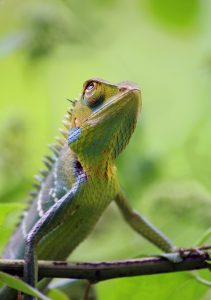Anxiety: the lizard and the chameleon
The ongoing uncertainty of the times in which we live is impacting the mental health of many people around the world.
With anxiety on the rise in Australia and spiking in Melbourne through the second lockdown, you may not realise how it can impact your wellbeing.
Can you recognise anxiety?
We all know what anxiety is, don’t we? Feeling anxious is something usually associated with a state of mind – uncomfortable thoughts, a tendency to catastrophise and acute episodes of panic.
Our primitive hardwiring for survival (aka our lizard brain) means anxiety can change the function of almost every part of our body.
Stress and associated anxiety automatically releases hormones from our adrenal glands that turbocharge our blood flow, muscles and nerves. We breathe more quickly and shallower, which can cause light headedness and tingling. The extra blood flow to the muscles can be painful. Conversely, altered circulation to the gut can trigger digestive discomfort or acute irritable bowel-like pain. Stress and anxiety can also throw our hormones in a spin, impacting libido, ovulation and blood sugar levels. When prolonged, anxiety can worsen underlying health conditions.
Anxious me? No!
One of the interesting things about physical symptoms of anxiety is we often don’t notice it in ourselves let alone in others. So the first step to ‘overcoming’ or learning to live with it, is simply acknowledging it.
Our fears can take control of our lives, until we name it. Acute anxiety can feel like a heart attack. A galloping heartbeat with chest pain that makes us break into a sweat should always be considered a medical emergency. But when diagnosed with a ‘panic attack’, it’s often difficult to believe our mind can cause such extreme, physical symptoms.
Hyperventilation Syndrome
Our lizard (brain) is a chameleon when it comes to the way anxiety presents.
I have seen countless clients who have experienced extreme and prolonged symptoms, seen up to a dozen specialists (cardiologists, respiratory physicians, neurologists, etc) and after exhaustive and expensive medical tests were finally diagnosed with anxiety.
Over 80 years ago hyperventilation syndrome was first reported in the medical literature, and to this day accurately describes these stress/anxiety induced symptoms.
This diagnosis is having a revival in modern medicine, particularly when the presenting symptoms trigger a change in breathing, which causes a drop in the body’s carbon dioxide level.

Photo by Nandhu Kumar on Unsplash
Knowledge is part of the cure
Feeling anxious is not a sign of weakness. Sometimes these anomalies become our superpower. But as Sarah Wilson suggests, first we need to make friends with it.
It’s estimated that 10 – 30 percent of otherwise healthy people suffer from hyperventilation syndrome. But the great news is that half of the treatment is simply understanding what causes the symptoms. Knowledge is empowering!
Naturopath have many tools to alleviate hyperventilation syndrome. Supporting the nervous system with herbs, nutrients and lifestyle tweaks can help reset how the body reacts to stress.
I also recommend learning Buteyko breathing, to control hyperventilation. This simple technique helps normalise carbon dioxide levels, which can reduce or eliminate these symptoms.
Consulting a psychologist may also be beneficial.
If you are suffering from anxiety or some of these physical symptoms, let’s work together to overcome them.
Mental Health Awareness month
October is Mental Health Awareness month. If you need immediate help in Australia, please contact one of the emergency support agencies listed below.
- Lifeline 13 11 14
- Kids Helpline 1800 551 800
- MensLine Australia 1300 789 978
- Suicide Call Back Service 1300 659 467
- Beyond Blue 1300 224 636
- Headspace 1800 650 890
- ReachOut reachout.com
- Care Leavers Australasia Network (CLAN) 1800 008 77





